"Many things in the world have not been named; and many things, even if they have been named, have never been described. One of these is the sensibility unmistakably modern, a variant of sophistication but hardly identical with it that goes by the cult name of "Camp."
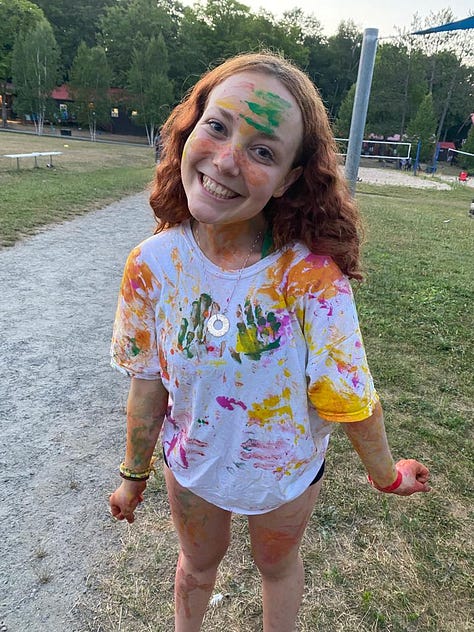
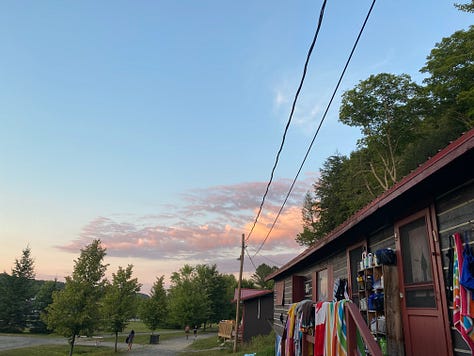
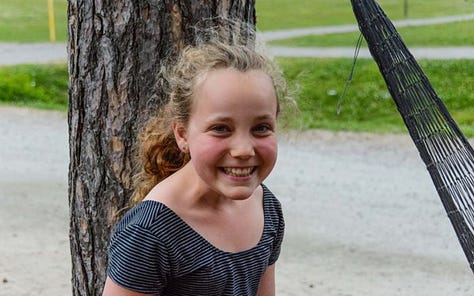
This is how Susan Sontag begins her famous essay “Notes on Camp”, where she talks about “one of the hardest things to talk about;” which is Camp, described as an aesthetic sensibility that is “esoteric – something of a private code, a badge of identity even,” which “converts the serious into the frivolous”. I don’t want to mislead you, reader, by suggesting that I’m going to meticulously engage with Sontag’s notes in a topically relevant or intellectually competent manner. I’m going to talk about Camp as I first engaged with it, as the place in Utterson, Ontario on Skeleton Lake where all the buildings have red roofs and lawn chairs line the sides of every grassy field. I’m talking about Camp as the beloved home away from home for Jewish children and teens who travel 2.5 hours north of Toronto to have the summer of a lifetime, year after year, generation to generation. Camp is first and foremost, to me, Camp Ramah in Canada.
“Notes on Camp” was first published in 1964, four years after the Ramah movement, a network of Conservative Jewish summer camps, opened its location in Muskoka, becoming the fifth Ramah camp and the first, and only, Canadian location. Sontag’s writing about Camp as a sensibility has resonated and continues to resonate with me when thinking about my summer camp, though this connection is utterly tangential and unrelated to Sontag’s notes on the Camp aesthetic—for starters, when I think of the “Camp aesthetic”, I think of water bottles covered in stickers and wrists full of beaded bracelets and sandals flopping down sandy gravel paths. Thus, I feel it’s important to acknowledge the fallibility of these comparisons if you were to hold them up under any light besides the one I’m casting here, which is the reading of Sontag’s words with my projected sentiment by simply swapping Camp—the sensibility, for Camp—the institution. I need not change a word to change the meaning, and if I fail at weaving Sontag’s notes with my own, I hope that you can, in the spirit of Camp, find the success in my passionate failures.
I’m writing to you now from camp, where I have returned as not a camper or a staff member, but a secret third thing. At camp, I am every version of myself that I can remember being here. I am the fearless eight-year-old ready for 2 weeks away from home, the first in her cabin to unpack her duffel bags before going onto the porch to write a bunk note—an online service that scans camper’s handwriting and delivers to parents’ emails—professing her immediate, uncomplicated love. I am the curious eleven-year-old eager to spend both months at camp, amazed at the energy of my first-ever first-session. I am the anxious twelve-year-old desperate to be liked, or at least tolerated, by the cooler popular girls in my cabin. I am the wide-eyed nineteen-year-old, head over heels in love with the independence and responsibility I had as a staff member and the experiences that independence begot. I am the frantic twenty-one-year-old trying to hold it all together as my campers, my staff members, and my supervisors all require different things from me which rarely overlapped.
Most of the time at camp, I am frizzy-haired and rosy-cheeked; my voice is a little hoarse, my hands are full, and my legs are on the move. If we’re in the dining hall, the chadar ochel, both as camper and staff, I am often walking around with a green apple in my hand and looking upwards to the plaques hung on the rafters, painted wooden archives of colours wars dating back to the 1980s. This is perhaps the most quintessentially “Dani at camp” image I can conjure of myself. I’m often not what I am right now, walking around with my eyes glued to my phone as I type this into my notes app, because it’s too hot in my makeshift cabin and I’m too restless to sit elsewhere.
This is my first summer since 2010, excluding the Covid-19 lockdowns of Summer 2020, where I have not returned to camp or to a Ramah summer program. There were many reasons why I didn’t return in Summer 2024 as a fifth year staff member, and though all of them are certainly valid and arguably worth exploring, the gist of it is that returning as a unit head, a Rosh Edah, wasn’t the best fit for me this summer—and I am now the twenty-two-year-old confident in her ability to make decisions, especially ones that feel necessary even as they feel sad. When I confirmed that I wouldn’t be returning for the whole summer, I offered to come up for a part of the summer to help with various camp jobs I enjoyed like the colour war, the plays, or a camping trip—the ultimate reason for my stint this season. During my first few days back at camp before the trip departs, I don’t really do anything. I don’t shush kids in the dining hall or tell them to go back to their cabins when I see them walking around way past curfew; I don’t ask first year staff members to put their phones away when I see them on Shabbat, or commiserate with head staff that no one sings during Tfillot. This time, I’m not really a staff member in any official capacity, I’m actually unsure if and what and when I will be paid. No one goes back to camp for the money.
The first weekend back at camp, I was restless. I kept saying to myself, and anyone who would listen to me, that being at camp without my people and without a purpose is so lonely I don’t know what to do with myself. “I don’t like how my brain works here.” was a message I sent during the peak of my anxiety on Saturday after panicking over my inability to behave normal socially in what is, theoretically, a familiar social environment. Like an antsy camper leaving home for the first time in a long time, I had forgotten what it was like to be back at Camp Ramah in Canada.
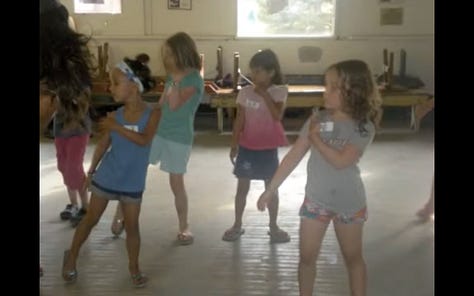
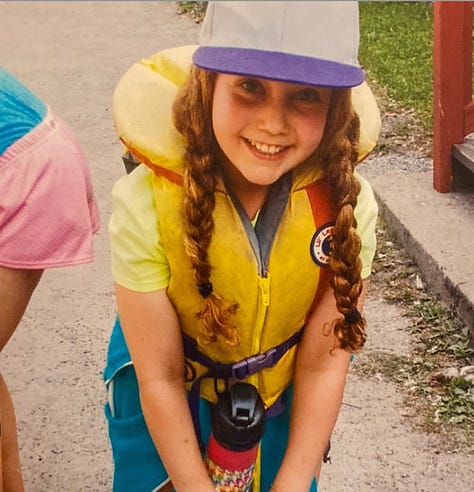
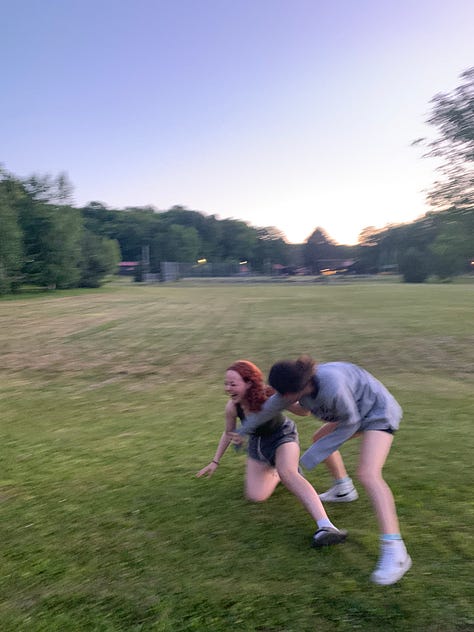
One of my former campers, who has grown three years and a few inches since I was her counsellor, tells me bluntly “none of your friends are here anymore because you’re so old now!” And she’s right on the nose, just as sharp and hilarious as I remember her being at 12 years old when we first met, when she took to me calling her Tie-Dye girl due to her being the splitting image of the minor character in 1998’s The Parent Trap. I continued to reunite with and say hello to my campers and friends who are still here; I walked around and noticed the changes between last summer and this one; I found shady spots to sit and read–something I rarely had time to do while working around the clock the last three summers. I brought with me two books: Jia Tolentino’s Trick Mirror: Reflections on Self Delusion, and Sandra Fox’s The Jews of Summer: Summer Camp and Jewish Culture in Postwar America. Though the latter book, one which I have been sifting through since last summer, is clearly the more topically relevant one, it’s the former book of essays that has most greatly shaped this one. Tolentino writes about ideas and touchstones and fixtures of our culture that I’ve been aware of and engaging with for the past few years, and yet reading her specific descriptions illuminates the existing dimensions of these ideas in ways that feels crucial, current, and inescapable. I would be remiss to not acknowledge Trick Mirror’s obvious influence on me as I read Tolentino’s reflections on the places and institutions in her life as I moseyed around what is, arguably at this point in my twenty-two years of life, the most impactful place and institution I’ve been a part of. Though the similarities pretty much end there; here, in this essay, I don’t think I’m breaking any new ground in sharing my current, personal understandings of my particular camp or its culture, but putting these camp thoughts to paper feels as urgent as it can ever be to write about a children’s summer camp. I’m leaning hard into the narcissistic urge to write about something so close to me that I’ve started to see my inherent bias as an authoritative advantage.
“I am strongly drawn to Camp, and almost as strongly offended by it. That is why I want to talk about it, and why I can.”
Right now, at camp, I am somewhat of an outsider—but I can never be a stranger when I’m here.
On Sunday morning, I woke up at 6:30 to prepare to leave for five nights in Killarney with 7 girls I had never been a counsellor for before. I was familiar with most of them, but me staffing the trip was largely a favour that I was happy to do. As I wrote about in another essay, my trip to Killarney in 2022 was truly meaningful in multiple ways; while I wasn’t intending nor expecting a transformative experience, I love camp and I love camping trips and I love being useful on both, these factors plus a break in my work schedule coalesced into the experience I’m writing about now. While at camp, my behaviour was stiff and nervy, out in the park it is instinctual. I feel my footing of purpose and duty return back to me as we paddle away from the access point. I notice what needs to be done and who is best for what job. I scope out which kids are excited for the challenge and which are concealing jitters. I tune into the social dynamics and how those dimensions are complicated by the individual strengths and weaknesses specific to the trip. I’m ready and excited to listen to them talk about their CIT kids and colour war and the food at camp this summer and what they are taking next year at school. I’m happy to answer questions about my Alonim summer and what I like about trips and if I’m friends with their other staff members and who was in my cabin as a camper and whether or not I think we’re close to the campsite and if I know what’s for dinner that evening. Simply put, I’m back in counsellor mode, and I’ve missed it.
An ongoing anxiety of mine this past year, my final year of undergrad, was that the only job I’ll ever be good for in my life is that of camp counsellor. Summer camp, tutoring, babysitting, nannying—all of my employment experience had been with children either in caretaking or educational roles, or in the case of overnight camp, both. Thankfully in the past few months I’ve landed jobs outside of camp, some of which fall under the other aforementioned categories and some do not; however my musings on the job market and my own personal arsenal of transferable skills are a topic for another time. In Killarney this time around, I all but forgot about this fear that camp was the only job I was good at, and I got to enjoy the feeling of being good at it. On this trip I realized not why I love it, but that I do. I knew I loved being a counsellor in 2021 and 2022, but now I was reacquainted with this appreciation, before the bittersweet understanding that I won’t ever really be in this position again, save for the camping trips here and there. Being a counsellor is wonderful ways that are simple and pure and earnest beyond the words I could try to use to articulate it. I had missed it, and I miss it again.
“46. The connoisseur of Camp has found more ingenious pleasures. Not in Latin poetry and rare wines and velvet jackets, but in the coarsest, commonest plea-sures, in the arts of the masses. Mere use does not defile the objects of his pleasure, since he learns to possess them in a rare way…Camp taste transcends the nausea of the replica.”
Love of camp and love of being a counsellor is a cyclical, replicable feeling. Two years ago in the same park, I realized that I wanted to come back as a counsellor for their Alonim/CIT summer; This trip to Killarney I had a materially smaller but no less meaningful realization: I think I’m actually a good camp counsellor. Like—I might be great.
I’m flawed, for sure. Though I’ve never intentionally put a child in unsafe physical or emotional situations nor have I neglected their needs, I’ve made plenty of mistakes and have numerous blind spots. While I take full accountability for them, and some I will attribute entirely to myself—like my athletic inability to coach intercamp sports or my suspicion that a camper was faking an illness to get out of something—some of my mistakes I think are more reflective of the pervasive ways in which being at overnight camp can obscure your sense of judgement. I’ve seen good people make bad decisions, many many times. I’ve seen kind people cause all kinds of harm. I’ve seen great counsellors be bad staff members and vice versa. I’ve seen myself try to justify insensitivities or subtle cruelties because I liked the campers perpetuating them. On the less-severe and more salacious side, I’ve broken boundaries by answering personal questions that probably could have remained mysteries—though oftentimes this was in service of confirming or denying rumours about myself that my campers had heard already from other staff members. But I’ve also turned a blind eye to harmless pranks, and I’ve turned a cold shoulder to children who committed harmful ones, failing to recognize that though they hurt another person, it’s almost always in response to a hurt they feel themselves, and my grudge against them wasn’t going to solve anything. I’ve poked fun at spots that I thought were solid teflon, but bruised kids nonetheless; had I known the impact of my words I wouldn’t have said them, but had I taken even a brief moment to consider them in the first place, they wouldn’t have left my mouth. Time at camp moves fast, and sometimes the calculated balancing of risk and reward fails because you didn’t take time to consider just how risky the situation is, or you put misplaced value on a shallow reward. Though recency bias, age, and the nature of my position make these lapses in judgement and the harm they reverberated less excusable, my wrongdoings at camp are not limited to my time as a staff member; when I think back to the moments in my childhood where I was the most callous, cruel, and unkind, most of them are memories that happened at camp. Perhaps me confessing these indiscretions is, subconsciously, my way of preventing myself from trying to come back to work at camp next summer; but if you’ve worked at a summer camp, especially a summer camp that is chronically understaffed, you know that present desperation can outweigh past indiscretions.
“22. Considered a little less strictly, Camp is either completely naive or else wholly conscious”
As a unit director last summer, my mistakes and failures feel more twisted, nebulous, and revealing of some of my least favourite things about myself. Those mistakes and memories are also quite recent, such that I don’t know if I have the perspective to write about them. I’m only now, nearly a year after my contract ended, able to hold my performance in the role within the palm of my hand, and my head has yet to wrap around the bulk of the pieces. What I will say, and what I’ve said since last September, is that while I think I could have done the “Rosh Edah” part much better, I am really proud of my work in the “Alonim” part of my job. The oldest unit at my camp is something of legendary proportions; Yom Sport, marathon, the play, the plaque, the banquet—it all still feels as important to me as it did as a camper, and maybe even more so. I could use my liberal arts degree to justify my love of camp traditions and the Alonim-specific programming by explaining them as the reputably powerful feeling of “being a part of something bigger than yourself”, or by saying that “I just like that these things have been done year after year and that they mean something,” both of which are true, and vague enough to be universal. But I also just love the specificities of my camp. I revel in our colour war’s tradition of four teams with eight colours to create distinct combinations that serve the story of an elaborate theme that no one actually cares too much about because the main thing is children screaming their heads off to collection of words both Hebrew but mostly gibberish that have become sacred. Still this summer, my first away from camp, I wanted to know the theme, the colours, the kids who scored the coveted roles of captains, judges, and roshes. I wanted to know all the specific details that have no material bearing on my life anymore, but mean so much to me nevertheless.
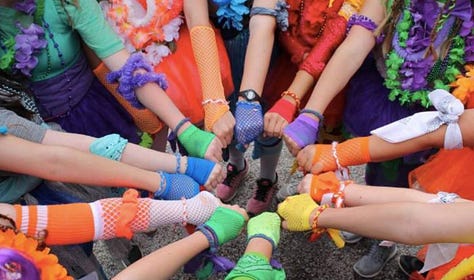
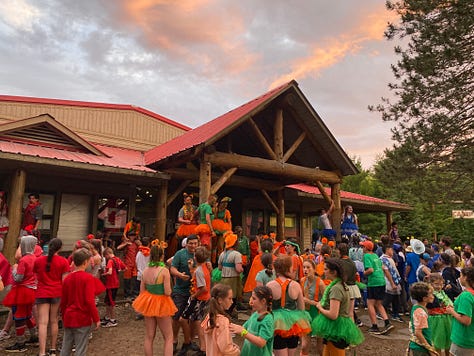
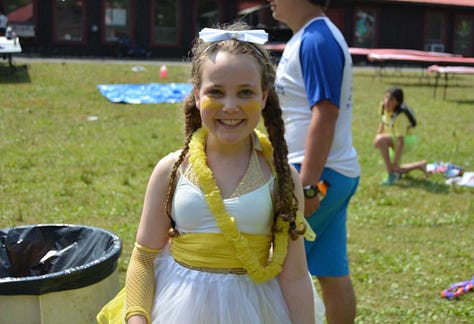
After last summer, as I returned to my routines and friends at school, most of whom are unfamiliar with my camp’s culture, I felt like I was speaking gibberish whenever I tried to explain what it was I was doing during the dog days in June through August. My stories of that summer, both the triumphs and the traumas, were shared with the caveat of “it’s hard to explain, but it’s a big deal at my camp”. I felt validated by their bewilderment and horror at the stories I told of real things I dealt with, and then promptly felt defensive of my camp, and the environment in which these colossal chaoses abound. Almost instinctively, I tried to justify and explain why it wasn’t actually as bad as I initially made it out to seem.
“3. Not only is there a Camp vision, a Camp way of looking at things. Camp is as well a quality discoverable in objects and the behavior of persons…True, the Camp eye has the power to transform experience. But not everything can be seen as Camp. It's not all in the eye of the beholder.”
As campers and younger staff members, my friends and I used to joke about having “camp goggles”, which is when you find someone attractive by virtue of you both being at camp, while in the “real world” you would never be interested in them. I think the metaphor of camp goggles extends to behaviours and feelings beyond the heteronormative hookup culture, and in fact, encompasses it. Camp goggles and camp vision can obscure the sense of reality and skew the moral compass. When I recall all the times throughout my tenure where people have been kicked out or fired or gotten in significant trouble, the stories start out as moments I lived through, then get churned through the rumour mill, and ultimately become legendary myths with rancid legacies, all of which are just kind of tolerated with a veil of “…yikes, that happened.” Key examples that immediately come to mind are when the boys in my unit were peeping through my cabin’s bathroom window to look at us when we were changing, as well as the countless, seemingly infinite times bodily fluids have been deliberately put in places where they should not go. Without camp goggles, these are crimes! With camp goggles, they’re…complicated. Understood as bad or problematic, sure, but nevertheless understood. Not quite justified, just quietly endured.
“To talk about camp is therefore to betray it”
I am merely touching the tip of an unfortunate iceberg, as sexual violence at camp is not new news. Two years ago a story broke about the lawsuit at a different Ramah camp regarding the camp director’s neglectful mishandling of a sexual assault reported by a camper in 2018. This raised important conversations about our camping movement, summer camping in general, as well as our specific roles that summer as Ramah counsellors; though from what I remember, most of these conversations were had between me and my peers, and not with representatives from Ramah. The story is deeply upsetting, and reflects a violent culture that is not limited to Berkshires, but recognized at camps across North America. One of the most infamous incidents at my camp was in 2013 when the Alonim staff was fired after counsellors planned an activity called Dare Night, where campers in the oldest unit are more than heavily encouraged to perform different acts, often sexual in nature, by way of peer pressure and desired involvement in—or rather, submission to— camp tradition. The tradition of Dare Night, as far as I know, is longstanding and nonspecific to my camp; I have friends at other camps where the exact same dare-centric activity also happens, and happens often. What was unique, and grossly so, about 2013 was that some of the staff members actively facilitated the program by writing the explicit dares. I honestly don’t know much more of the details nor do I want to, I know the important points of the narrative: campers felt uncomfortable, they told staff members, staff told higher-ups, all of Alonim staff was fired, including counsellors whose involvement in the program wasn’t confirmed. I was eleven when this happened, I remembered my unit’s performance of Tangled being halted by the Alonimer’s riot against the decision. At the time, I was confused, scared, and greatly unaware of how unambiguous this decision ought to have been. I couldn’t fathom how uncomfortable and potentially traumatizing it would be to witness and perform the sexual dares suggested to sixteen-year-olds by members of their staff, who were at least nineteen or twenty. When I was that little, I could only kind of understand why my CITs would tell their older siblings on staff what had happened, but I wondered if they still would have reported it had they known the outcome that would follow, along with the resultant rage from their peers. Whistleblowers are fun-squashers, whistleblowers call attention to things we don’t want to admit are bad because it forces us to look closer to the problem, if we weren’t already an active perpetrator.
“If the betrayal can be defended, it will be for the edification it provides, or the dignity of the conflict it resolves. For myself, I plead the goal of self-edification, and the goad of a sharp conflict in my own sensibility.”
Five years after 2013, when I was in Alonim, us campers planned our own Dare Night and, notably, attempted to make it tamer and more consensual—but we still did it, we still wanted to be a part of this tradition. We felt entitled to a ritual we knew was risky, scandalous, and troublesome—but as a result of and not in spite of its harms, it was enticing. Though our staff, some of whom were Alonimers in 2013, knew better than to plan it for us, as does every Alonim staff in years since, the tradition persisted through word of mouth and mob mentality; just last year I caught my campers doing Dare Night before they even started. There is never going to be a way to eradicate the potential harm at summer camp, the best you can hope for as a staff member is to prevent it where possible. And yet, as mentioned before, I guarantee that my actions as a staff member have inadvertently harmed campers because I failed to use good judgement.
I must reiterate none of this is said to defend or justify the 2013 staff members’ actions, rather their lack of impunity illustrates just how skewed judgement can be within the bubble of a home away from home. To put children in a sexually violent situation is a bad thing to do, obviously. Why do we even need to say it? Why do we ever think it’s normal? It shouldn’t be normal, and yet it is, to describe the culture of sexual violence and harassment at camp as emphatically real and relevant; it sticks to campers and staff like bug juice spilled on a picnic table, baking in the summer heat, trickling down and staining wherever it lands. These are teens and young adults with loosened supervision and flexible rules—what did you expect? It’s not an excuse, but it’s certainly a lens I’ve seen people put on, over and over again.
The lawsuit against Ramah Berkshires notes director telling the victim, herself a child in 2018, “in sum or substance that, ‘I don’t really think this is that big of a deal, he [the assailant] is just a horny little boy.’”; that same summer at a camp in Canada, 900 kilometres away in distance but mere footsteps apart in ideology, the girls in my cabin were offered lousy sentiments cut from the same cloth as the Berkshires, a fabric invoked to cloak misogynist aggression and suffocate ugly truths. Regarding the boys who taunted us with the threat of spying on our naked bodies, we were told that it was just some tit-for-tat prank war. They were just trying to bother us and we didn’t need to make it a big deal. These situations are not equivalent, thus the attitudinal similarity across their responses is upsetting on so many levels.
My poor judgement at camp, regretfully, extends to these matters as well, I am not immune to the specific toxicity of a culture I was surrounded by, and occasionally entertained or even lauded. I have visceral flashbacks to the instant regret and embarrassment I felt when I tried to retell a joke I heard from the boys in my unit, the punchline of which was essentially “rape is a funny word to say, and so we should say it right now!” I think I only retold the joke once before I said it to a counselor whom I looked up to, in large part due to her feminist sensibility. She called me out on it, rightfully and immediately. “And what’s so funny about rape?” She was acerbic and I was stung with shame. Nothing. Literally nothing was funny about it. I proclaimed myself a young feminist and I couldn’t take one second to question if this rape joke was funny and why the boys didn’t care that it wasn’t. I still cringe at this memory, but I have more compassion for my younger self, one that is borne not out of self-exceptionalism, but rather the banality of my bad judgement. I am a part of the problem, we all are.
“For no one who wholeheartedly shares in a given sensibility can analyze it; he can only, whatever his intention, exhibit it. To name a sensibility, to draw its contours and to recount its history, requires a deep sympathy modified by revulsion.”
When you grow up in these environments, when these spaces are the backdrop to your personal experiences or significant moments across sexual and romantic development, it can be embarrassingly difficult to remove the camp goggles and try to see things with mature clarity. That is not to say that I in any way condone or diminish the real harm that people can be and are subjected to at summer camp. Rather, it is through my routine, consistent acknowledgement and frustration that summer camps, broadly speaking, have a toxic sexual culture, that I too become complicit in my exhaustion towards this still being a problem. As I read my own writing, I see my exasperated apathy towards the situation improving significantly and swiftly.
When I was younger, I felt gender and misogyny at camp were fires I had to quench or at least pursue fighting, even as it made me wholly unlikeable and annoying. I excitedly joined a task force ahead of Summer 2021 which was aimed at improving gender, sexuality, and inclusion at camp. Camp is inherently a binary place, children are divided into cabins on either “Boys’ Hill” or “Girls’ Hill”, and though, importantly, inclusive practices and protections for trans and nonbinary camp are actively implemented, the presence of homophobia, transphobia, and misogyny is undeniable across most summer camps with binary gendered bunking.
On the first Shabbat of camp after our task force meetings, during staff week training before the campers came, I was in tears at how the culture, I felt, had immediately reverted to the boys’ club I had remembered. The most religiously observant (non-egalitarian) male counsellors had quickly taken what felt like ultimate control of Chadar Oneg, the time where we sing songs after dinner on Friday night. Afterwards in a gazebo, we complained and vented and discussed the difference between soft and hard power, explaining to some members of the impromptu focus group that though most of the head staff are women, whether or not they had been historically respected was debatable, and whether or not they would be respected in their roles by male staff and male campers that summer was not a foregone conclusion. How and why female staff are treated and talked about is somewhat of a taboo case to crack, in part because the root of the issue is undoubtedly too big for a group of women in one summer camp to solve in one summer. How do you explain to your supervisor that though she holds power and has good intentions, the limitations of her potency are implicitly contoured by the stifling force of patriarchy that is present in both our society at large, and our camp as a microcosm of the communities we live in? Well, if you’re almost nineteen and about to experience the most face-to-face human interaction you’ve had in 15 months post-global pandemic, you mostly complain and debrief with your friends, and feel momentarily better until the next instance of camp sexism rears its ugly head. Then you go from trying to amplify what you see so clearly as misogyny in hopes that others will be forced to reckon with it, to trying to contextualize it on more digestible terms so that the most agreeable men, the nice-good-cool-guys, can get on board with casually resisting.
“34. Camp taste turns its back on the good-bad axis of ordinary aesthetic judgment. Camp doesn't reverse things. It doesn't argue that the good is bad, or the bad is good. What it does is to offer for art (and life) a different - a supplementary - set of standards.”
As a staff member, I remember pleading with another counsellor to kindly have his fifteen year old campers stop making comments that sexualized my twelve-year-old camper, or at the very least, try to shut the conversation down if and when he heard them talking about her. When I heard that this was going on in their cabin, I was repulsed but unsurprised, and then doubly repulsed at my immediate recognition that their objectification of female campers was typical behaviour. On a consequence scale ranging from pats on the back to getting kicked out of camp, this seemed somewhere between an eyebrow raise and a half-hearted finger wag. The justification he gave was that she wouldn’t ever hear these comments, that they were just jokes, and that they weren’t even jokes targeted at her but rather intended to bother her male relative who was a friend of the boys. I can’t remember if I told him that even if that were all true, it wouldn’t make it any less offensive. Perhaps more importantly, his excuse of their behaviour precariously hinged on our mutual acceptance that though sexualizing a twelve-year-old is grotesque and offensive, because it is intended to offend her family member and not to the girl in question, as this logic would follow, her personhood is materially irrelevant except for when it can be a pawn used to emotionally antagonize her male relative. That justification reeks of the kind of archaic patriarchal ideas which once again, feel so apparent to me when I perform the briefest analysis of the dynamic at play, yet remains unseen and unheard by the men in power. But I didn’t have time to write an essay about the implications or ramifications of my camper hearing these comments about her, I just wanted to protect her from a culture that she was already a part of. I remember leaving that conversation frustrated, though the counsellor agreed he would try to shut down any comments he heard his kids making about my camper and her body, he maintained a sense of ambivalence which suggested that he, at best, couldn’t understand the multiple harmful implications of these comments, and at worst, didn’t think it was a real problem worthy of concern. This is a common frustration when trying to shift misogynistic culture, it takes so many words to explain why something is harmful or gross or unnecessary, it takes way less time to shrug it off and hope no one hears. It’s a fair point to make that if these comments and jokes were restricted to the cabin, she likely wouldn’t have heard them, so then no harm, no foul, right? But it’s precisely this—what happens in the boys’ cabins, away from counsellor supervision or the presence of women, that concerns me to no end. I’d like to keep my belief that a majority of the time it’s likely harmless fun, but I also know too many instances where boys having fun or boys being boys is euphemistic code for boys talking about girls in ways that reflect textbook-definitions of misogyny and violently reverberate throughout a coed camping community. Sure, these jokes were made in the cabin. But I still heard about them, unsurprisingly from a concerned female staff member who heard it from the boys themselves. I was anxious at the possibility that my camper could hear her own objectification played for laughs, and wrought with imagining the ways in which this could impact her at that impressionable age, or even worse, what the logical extension of these boy’s attitudes towards her could look like in the future. Maybe she wouldn’t have cared and would have shrugged it off (possible), maybe she would have taken it as a compliment (unlikely). I know I couldn’t protect her, or any of my other campers, or even myself or my peers, from experiencing the kind of objectifying comments men and boys make, but I didn’t want her to feel that way on my watch. I wanted to prolong the period of time in girlhood where you aren’t acutely aware of what is being said about your body and how you are perceived by the male gaze. But then again, who am I to assume that my camper was still in that age of innocence, and who am I to assume that this idyllic age is even real. I don’t remember the exact moment I realized that the pervasive force of patriarchy renders womens’ bodies property to be consumed, I don’t even remember the first time I myself realized my body was subject to this dehumanization. But I do remember the first time I learned that boys liked to talk about girls in a way that felt more scandalous, more systemized, and, I thought at the time, more sexy than the simple sincerity of schoolyard crushes. I remember where I was when kids realized there was a system to the scandal. It was here at camp, in plain sight and literally written on the walls.
“21. So, again, Camp rests on innocence. That means Camp discloses innocence, but also, when it can, corrupts it. Objects, being objects, don’t change when they are singled out by the Camp vision. Persons, however, respond to their audiences.”
I remember being actually upset when they covered up the multiple rankings list of “hottest girls”, which, in my memory, outnumbered the list of “hottest guys”, at one point in time written on the windows in the Moadon Alonim, the venerated location at camp for the oldest unit. Being in Moalo is a rite of passage for the oldest kids, except for in 2013 when there were too many of them for the small building, so a younger unit had morning prayers there, and thus the rankings list were concealed—first by moustache-printed duct tape, and later covered by black paint. I couldn’t tell you who was on the lists nor when they dated back to, I honestly don’t know if anyone else my age remembers them the way I do because it’s been over 10 years since they were on display. Regardless, eleven-year-old me was privately confused as to why a piece of history was being erased, and even more privately curious as to who these people were and what about them earned them a spot on that list. Desirability politics, particularly at summer camp, is something I’ve thought about for about almost as long as I’ve been going to camp; for more on this there is “The sensual politics of our youth” episode of my and Maya’s podcast though, fair warning, I haven’t listened to the episode after we uploaded it, and I’m sure our perspectives have grown in the two years since.
Despite the bygone Moalo rankings and the graffiti’s swift removal, rankings lists were still around at camp as long as I was a camper, and I imagine they’re still around now. It would be unfair of me to not include my own complicity in the rankings culture, as my cabin, fourteen and fifteen at the time, decided to write a rankings list of the boys in our unit on the back of our cabin plaque. In the years since I think it may have been covered, but I remember doing it nonetheless. I also remember trying to absolve ourselves through the time-honoured excuse that “they do it to us all the time!” And though that was true, it doesn’t make our actions any less problematic, or our frustration any more honourable. Maybe I hoped my actions could be vindicated as part of some greater feminist resistance by giving the boys a taste of their own medicine. However, my righteous rage was filtered through the spotty moral compass of fifteen year old who, in all likelihood, just wanted to be cool and wanted to be liked and wanted to talk about boys with her friends on the last night of camp. For all the harm that rankings lists can cause, I have to give them credit for being a structured activity that keeps kids busy and entertained; if only they could be ranking things that are actually things and not humans.
Perhaps an even worse evolution of the list, I remember the prominence of “girl drafts” where, like they were crafting a fantasy sports team, boys would draft and trade girls across the oldest units and sometimes staff, based on who they thought was the hottest. This, in my memory, was always met with outspoken anger from girl campers and staff alike, though the other underlying feelings: relief, sadness, insecurity, curiosity, or indifference, are harder to make space for. All of these emotions, except indifference, position the draft as something that matters, something that girls care about, which only further upholds the apparent power of the male gaze to determine a teenage girl’s value. I remember hearing that one guy traded his team for a cup of instant noodle soup, and this was supposed to be appreciated as some kind of feminist-king moment where he removed himself from the ritualistic objectification. And sure, he revoked his interest in the game and, as a popular 16 year old boy, thus challenged the practice’s importance and cool-factor. But with a closer look, this feat relies on these boys drawing an equivalency between seven to ten real human beings, and 65 grams of camp contraband. My friends and counsellors and colour war captains were collectively worth 290 calories and 1110 grams of sodium.
That year, I remember hearing that the draft began on an all-boys bus back from intercamp. As is the case with many camp stories, you have to ask, as I often do, “where were the counsellors?” Whether the answer is that they weren’t paying attention, they heard and chose not to intervene, or they actively encouraged it, all of the options are bad, unsatisfying, and unsettling in their own ways.
I have never really questioned or doubted my gender identity as it pertains to my gender performance or sense of self, however I don’t think words could describe how much I wish I could be perceived, listened to, and admired the way cool young men at camp are, seemingly effortlessly. I don’t know if they understand just how much a simple “not cool bro” goes in terms of shaping the culture of how male campers act around camp. As a camper and staff member, I cared so deeply about shifting camp culture, while always aware of my lacking ability to do so. I was the weird kid in the cool cabin, which is honestly a pretty fun role to fill, but it doesn’t really afford you much useful social clout. As a counsellor, I was certainly aware of and more capable of impacting changes at camp, but I was also busy with the role of being a counsellor and, especially in summers 2021 and 2022, the issues my campers were dealing with seemed to eclipse larger reckonings with camp sexism, even as the problems themselves reflected or were exacerbated by existing sexist attitudes.
By the time I was a Rosh Edah, now one of the many women at camp holding positions of power but feeling like I lacked the “it” factor that made women at camp respectable authority figures the way men could be, I had developed tactics to tolerate the casual misogyny I didn’t want to declare as such out loud. I had become what eighteen-year-old me thought was “part of the problem”, a woman acutely aware of why she wouldn’t be as implicitly respected as her male counterparts, yet unmotivated to change or even really articulate the sexist overtones of her circumstances. Last summer, I had colour wars to plan and morning prayers to lead, so whatever the boys were saying about me—my appearance or my body or whether or not I was a bitch or being bossy or being a fun-squasher or favouring the girls or whatever the anxiety-de-jour made me hyper aware of—its impact on me as a person and woman would be dealt with at another time, what mattered in the moment was how it impacted my ability to do my job. How I was perceived was useful information that informed how I ought to approach my role and tune my performance of “woman/person in charge/woman in charge/person”. For me to do my job—of caring for and overseeing the physical, emotional, programming, and religious needs of my campers—the kids had to either respect me or like me, and while ideally they would do both, the general consensus on Rosh Edah Dani is not a healthy one for me to fixate on, even a year later.
I feel like now is an appropriate time to reiterate that I know I’m not writing about my time as a unit head with the most clarity; furthermore, I haven’t really talked in-depth with fellow unit heads about their experiences with subtle misogyny, and so these reflections might entirely be the product of my own insecurities which I’m trying to understand through the critical lens I’m most familiar with. When I think about the women at camp who don’t take shit from anyone, who have even the most unruly teenage boys listening to them lay down the law, it seems like they’re above it all and that that’s key to their respectability—when I think about who these women are who I’ve seen and been inspired by, I know that they know that they’re still affected by the systems of oppression we all encounter, but I wonder if they’ve somehow managed to trick the boys into thinking they’re too cool to be thinking about sexism. I, perhaps unfortunately, think I project the kind of energy that indicates that I am always thinking about gendered power dynamics. I don’t know what it is about me, maybe the pronouns in my bio or the books I would read on Shabbat or that I don’t really shut up about gender and sexism and can tend to make it a relevant talking point when debriefing the average camp kerfuffle even while most others kind of silently acknowledge the quiet part without saying it out loud. At least I imagine they notice it but just don’t say anything, because how could you not notice one of the longest, most tired societal trope that is implicitly hating women? Just as such, I’m almost certain that the cool girl leaders I revere know their status is upheld by the qualities they possess which seem more immune to misogynistic dismissal than the ones I see in myself. Last year I felt I was in constant defence of my leadership style which was, in a word, sensitive. I didn’t like yelling and I don’t think I yelled often, in part because I never felt confident doing it, and in part because I never felt listened to when I did. This is maybe some kind of Catch-22 or chicken/egg situation, maybe my fear of being seeing as bossy or shrill kept me from demanding the kind of authority that bossy and/or shrill women can often wield, through gritted teeth and with the knowledge of their precarious reception. I’ll confess something that I’m both ashamed and acutely aware of: I would, still, rather be liked than be respected. It’s unfair, but I think women, especially in summer camp settings, have to choose between two. I could have shut down the traditions I thought were gross and unreasonable, it wouldn’t have been easy—in fact it probably would have made my job in every other aspect of the summer near-impossible—but it could have been done. Instead, I tried to negotiate with children, which is a slippery slope to say the least. I wanted to be liked more than I wanted to enact change. Once again, we’re at a Catch-22; you can only shift culture when you have power within it, but you can only wield power if the culture shifts in your favour. There are still many problems that impact me, my peers, and campers at camp. Me writing about these problems doesn’t eradicate them, just like me vying for likability didn’t raise my cultural capital; still, here at camp, I wish both could be true.
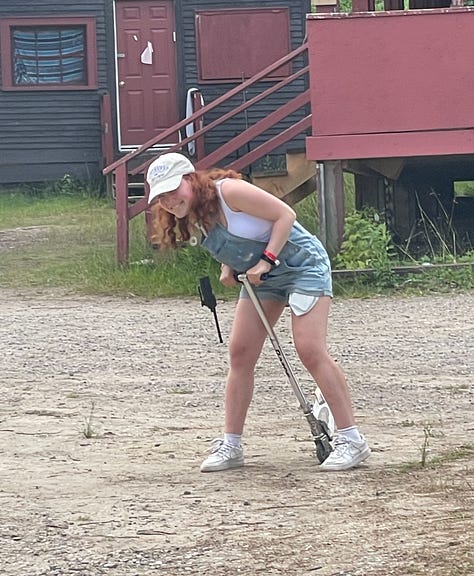
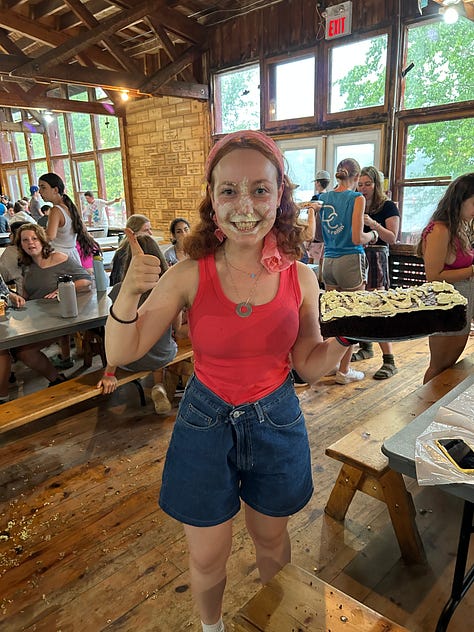
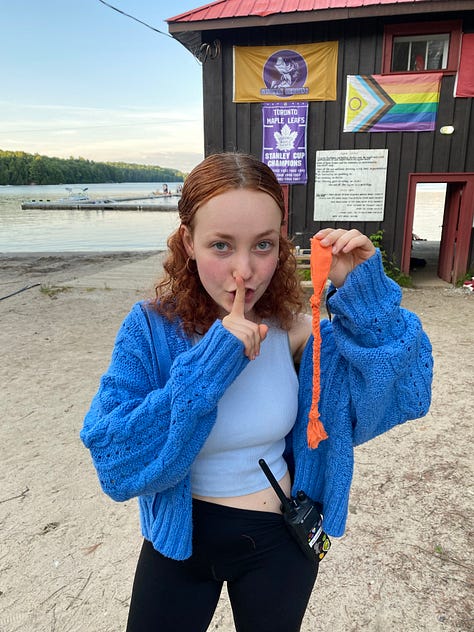
I wanted to be a cool girl leader, I wanted to seem casually competent and understatedly powerful and above it all in a way I don’t think I’ve ever been before about anything in my life. Camp is a place where my greatest strengths and limitations as a leader are often attributed to the same traits: I can’t like things in a chill way, my investment is all-encompassing, I want to give everything—my time, energy, heart, soul, spirit, beliefs, vision—into the project I’m passionate about. My heart is on my sleeve and it’s really hard to hide. I’m not stoic, I’m incredibly permeable. On the night that we announced which kids got the Yom Sport positions they tried so hard for, I stood in front of my 16 year olds, the list of winners on a paper in my visibly shaking hands, and I read out the names through tears in my eyes. I knew how badly they all wanted this, I knew how sad it would be for many of them. I didn’t think I would cry, and though it was definitely influenced by my lack of sleep and general stress in the days leading up to the Big Day, I still felt the way I did. That feeling is not foreign to me now either. If I were to be in that position again today, I’d like to think I’d have a better grasp on professionally concealing my feelings, but I don’t think I would feel any differently.
Still, I don’t think it’s a sign of weakness to be emotional as a leader. I don’t want to imply that the ideal leader isn’t, for lack of a better phrase, a hysterical woman. But I am aware of the reputation. Maybe I should be a bit more charitable towards myself, instead of sensitive, I’ll say passionate. I care, and I still do. And I wish there was a way to not care about how my care is understood and perceived. I know I sound like a broken record, but I am a part of these problems at camp, and my specific involvement in and connection to this problem feels close to me in ways I wish I could escape. Consider this my formal apology to all the female counsellors and roshes and staff members I’ve had at camp who I’ve called bitchy or bossy or taken part in mocking for them simply doing their job. And sure, they weren’t always perfect or even necessarily good at their jobs, neither was I and neither was anyone; but when I look back on my camper summers when they were my staff members, the moments of joyful summer fun appear immediately and easily, it’s almost always a conscious effort to remember the ways in which they fell short. I cannot confidently say that I assume they feel the same way.
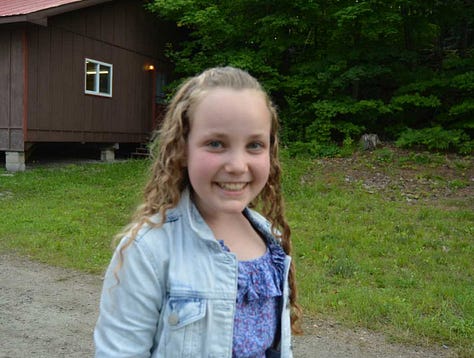
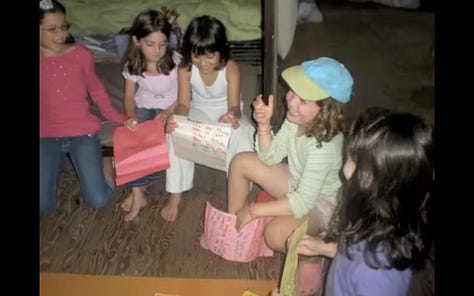
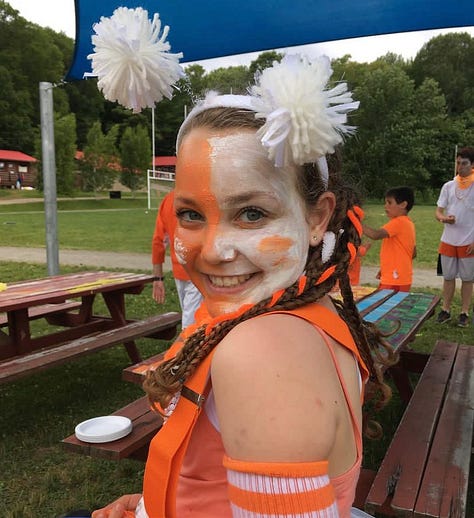
In general, I’ve found it easier and more enjoyable to exist at camp as a counsellor than as a camper. This isn’t suggestive of me not having had fun or enjoyed my childhood summers because I undoubtedly did, rather it’s indicative that I am someone who, generally speaking when regarding the better part of my adolescence, thrived when I felt needed and useful by the adults around me. At school when I tried hard it was rewarded with good grades and leadership positions on student council, at camp when I tried hard I felt like a try-hard, uncool and annoying for wanting to be a part of all the action, all of the time. As I got older, though, there was more to be done; I found footing in the specific roles I would carve for myself, I would be the last camper up late washing paint brushes and the first to wake up to move the sets that dried overnight, dedicated to keeping our Yom Sport theme a secret from younger campers. I cared, deeply and fervently. As an Alonimer, rejection of these campy intricacies felt like a rejection of my ability and desire to do them well. If Yom Sport proyect isn’t memorable, if our all-Hebrew production of Annie isn’t showstopping, if I’m not the best CIT ever, what was the point of me being here? I took not getting a Yom Sport position harder than I wanted to let on, I think I cared less about the actual role or learning the judge’s secret than I cared about my staff members, who selected the judges, and their perception of me. I fantasized about cool older staff members appreciating the essay I wrote, liking me as a camper, or even thinking I was an “underrated” member of the edah. I wanted the validation that nearly every sixteen-year-old craves.
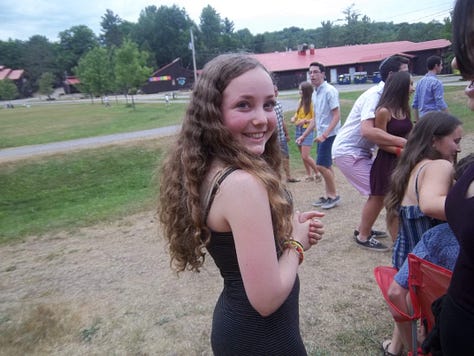
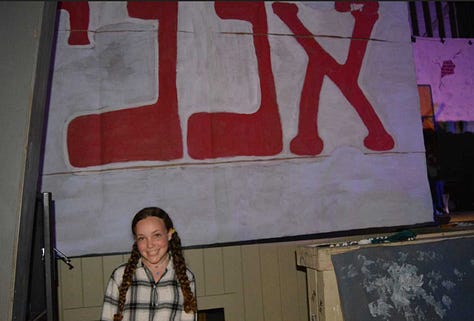
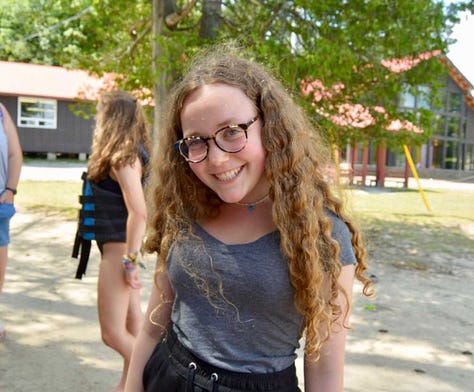
Last year, as I shifted into what is in many ways the ultimate role when it comes to affirming sixteen-year-olds with the kind of summer camp approval we all want, I myself still sought approval and validation— less so of who I am but rather of my ability to do the job I was hired to do. I had never before been a Rosh Edah nor an Alonim counsellor, I was doubly under-experienced and well aware of what the narrative of me might be leading up to the campers’ arrival. I wasn’t the first choice, but I wanted more than anything to give these kids an Alonim summer. I wanted to be not just good, but great at this job. Sometimes this meant I turned away from burning bushes in an effort to put out a bigger fire; I found myself letting slide the same behaviours I once vowed to get rid of, because my success in my role often hinged on the mob-mentality of sixteen-year-old children and whether or not I was the ally who fought for them to keep the “camp traditions” they felt were their birthright, or I was the enemy who took away everything they loved about the place their parents spent thousands of dollars to send them to year after year after year. Sometimes, the things my sixteen year-olds cared about felt arbitrarily silly to me in my big age of twenty-one, but I understood them nonetheless. Yes, the dress code for the “rave” with the Magen Boys later tonight does really matter this much; of course, the Nacho girls shouldn’t disrespect you by braiding their hair the way you do for Yom Sport in Magshimim; I know, I know, it’s so annoying that you can’t bring non-kosher noodle soup into our Jewish summer camp dining hall.
As much as we joke that camp isn’t a “real job”, last year camp felt the most like a job it has ever been for me. I felt keenly aware that I was hired to fulfil a duty, a specific and demanding one. I’m talking labour— like Karl Marx, capital L, Laayyyy-borre. I was averaging less than 5 hours of sleep per night pretty consistently over eight weeks; some days I would wake up, realize the length of my to-do list, and then feel my face quickly curl into a frown as I stifled tears because it was too early to audibly cry. Other mornings I would fall back asleep in between my alarms and dream that I had woken up and gotten dressed, walked to the Moalo, and started leading tfillot, before ultimately waking up for real, confused and disappointed that I hadn’t moved. Whenever I my name was called on the walkie-talkie I fearfully dreaded hearing the reason behind the call and what chaos my campers (and staff) had likely gotten into. I was distracted from almost all other areas of my life. In September, I said that a lot of fun was had that summer, but it wasn’t really being had by me. But I also loved this job; I love my campers dearly and, in a very nerdy and documented way, I love the specificities of the Alonim program. It was an experience I’m grateful for and wouldn’t trade for all the sleep in the world. Now when I look up at the plaques, I see my own name cemented in camp history not once but twice, as a camper in 2018 and as the leader of the Alonim operation in 2023. This version of me, six Hebrew letters painted on a piece of wood in a specific spot, will exist at camp longer than I will.
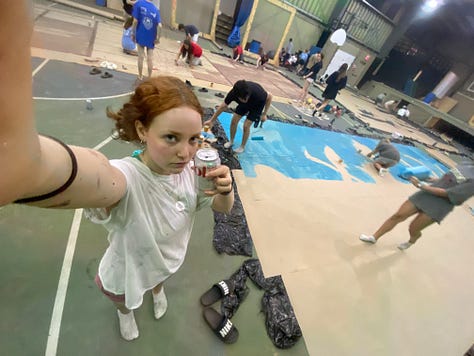
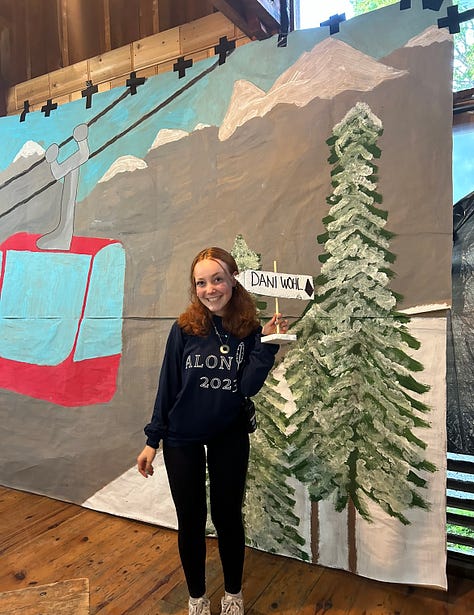
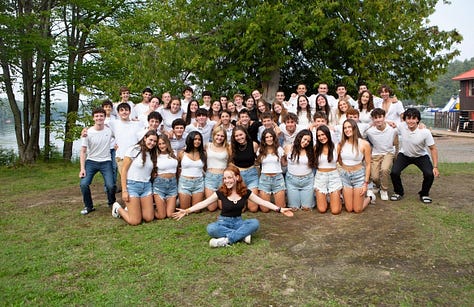
On the last night of camp in 2023, one of my supervisors told me that I would “probably spend a long time unpacking what happened this summer”. I think this was said in direct reference to an incident that happened shortly before, one which I need even more space before writing about, but the sentiment continues to ring true for everything from last summer, not to mention the twelve other Ramah summers under my belt. During the ten months we live between, or for, the two at camp, I unpack and debrief and struggle and reckon and remember and forget and fall in love with camp again and again. My friends have joked that our relationship with camp could be categorized as Stockholm syndrome, it’s not not true. Over the most recent ten months, I realized that I am extremely privileged with, relatively speaking, the ability to choose my employment opportunities. When thinking about potential jobs at camp, the working conditions—namely the stress, physical exhaustion, and the emotional/mental burden of enduring the kind of psychological intensity that exists within the camp bubble—were not adequately compensated for by the pay nor by my love for camp, the latter of which usually supplements the former, and together they have historically outweighed the aforementioned detractors. I don’t want to indicate that this is the sole reason why I didn’t come back to camp, because there is no sole reason and these feelings aren’t at always the forefront of my ongoing reckoning with what it means to work at camp. Again, ultimately, it wasn’t right fit for me this summer. And yet I’m here—for just a week, and yet I’m writing—for longer than I thought I would.
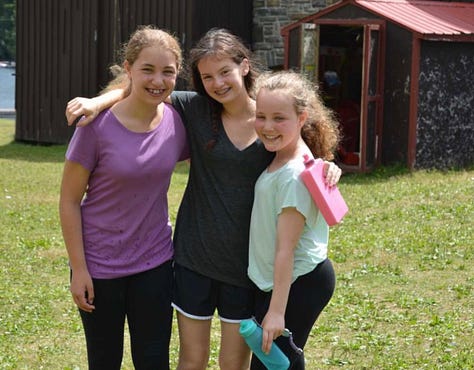
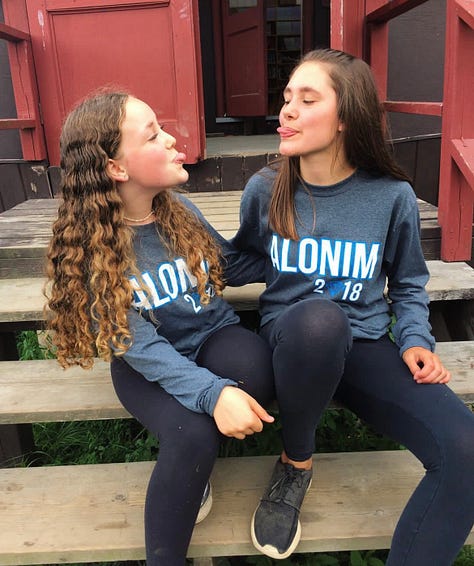
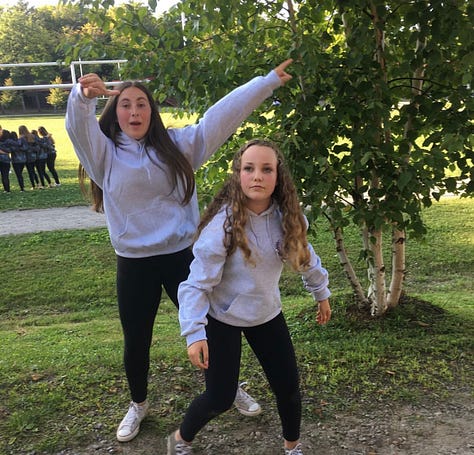
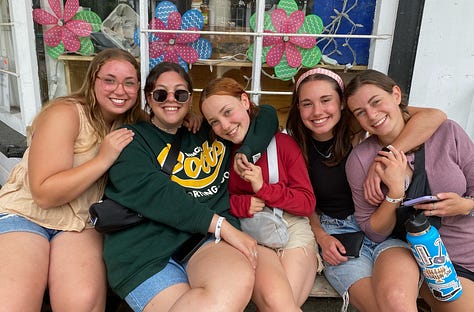
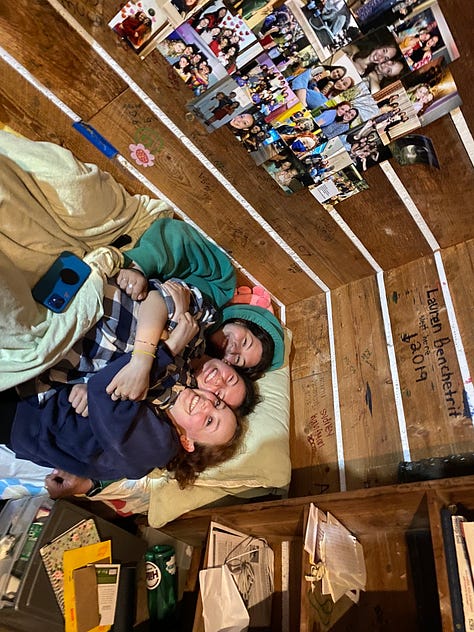
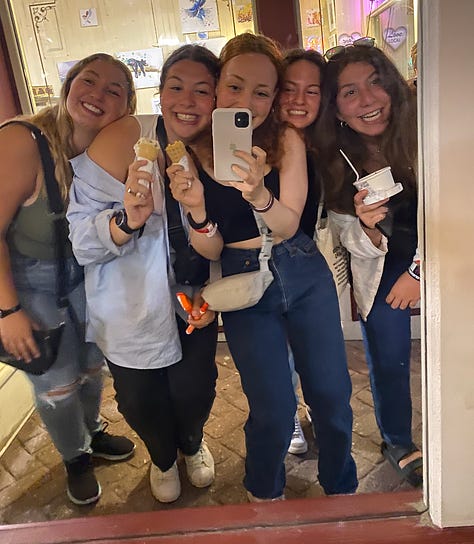
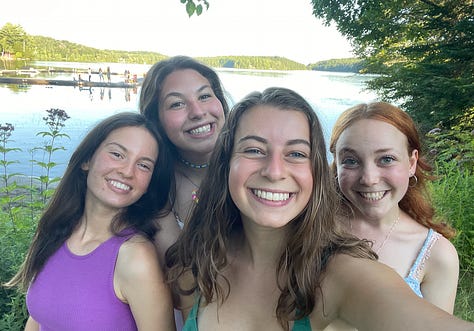
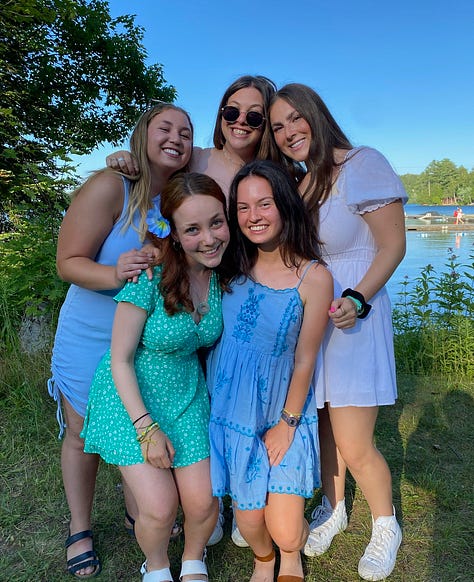
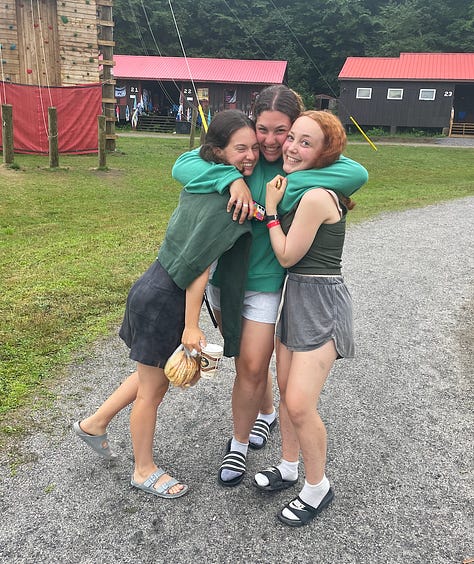
“56. Camp taste is a kind of love, love for human nature. It relishes, rather than judges, the little triumphs and awkward intensities of "character."...Camp taste identifies with what it is enjoying. People who share this sensibility are not laughing at the thing they label as "a camp," they're enjoying it. Camp is a tender feeling.”
When my best friend Maya came to visit early in the summer, we spent a lot of time talking (as we always do, with great success if I do say so); one night we were talking with more of our closest camp friends, Sarah and Amy about camp and more specifically, the different problems and scandals throughout our camp’s history. While recounting the many moments and memories, some with laughter and some with horror, I found myself once again coming to camp’s defence at the suggestion that it might be rotten to the core, at the idea that if everything were to come to light in a documentary or investigative piece, there’s no way it would be able to last. This idea, of camp being shut down, filled me with an immediate despair that was, honestly, a bit embarrassing for a young adult to feel regarding a hypothetical scenario. Especially a scenario where an institution is, ostensibly, being brought to justice. Especially one where, ostensibly, an institution is being brought to justice. “I’m too nostalgic to be a radical”, I wrote in my journal that night, attempting to capture how I still feel too close to the warm gooey goodness of summer camp to see the forest for the trees. Or rather, I didn’t want to see the forest for the forest fires. This isn’t just my white-knuckled clinging to the rosy idea of a place where everything is perfect or safe— I do earnestly believe that, even with all of camp’s many problems, this is an important place where people do important work that serves an important purpose. Camp is important, in all its frivolity and excess. Camp is also really difficult—difficult to defend, difficult to write about, but mostly, camp is difficult to work at.
There are hundreds of normal, politically unproblematic, reasons why camp work is hard work, reasons I barely touched on in this over 10,000 word essay. Have you ever tried changing the bedding on a top bunk infested with ants after your twelve-year-old camper spilt red gatorade on her blanket and left it there for a week? Scratch that, have you ever had to run up a hill to your cabin in the middle of a meal to ensure your camper wasn’t stealing another camper’s bunk notes and thus inadvertently committing mail fraud? No, no, have you ever tried *quieting* a room of children in effort to give them instructions for a scavenger hunt? Like literally just asking a group of kids to be quiet? These are feats requiring Olympic-levels of stamina, and I’m only half-exaggerating when I say that. These are all true stories about my campers, all of whom I have a deep love for. Love and care aren’t hard emotions to feel for your campers, but liking and caring for them at camp can certainly be hard work. In 2021, a challenging but rewarding first summer back during the pandemic, our camp director said we were doing Avodat hashem— God’s work, holy work. I think about this often when I think about camp. Summer camps trying to stay open amidst all the problems and challenges and barriers to its endurance is, in many ways, a testament to the collective human spirit. It’s not about camp wanting money, it’s a nonprofit. It’s not about status, there’s no rankings list of Ontario Jewish summer camps by any metric that matters to most people, as far as I’m aware. It’s about Jewish children and teens having the summer of a lifetime, year after year, generation to generation, since 1960.
And yet, when my friends question the likelihood of sending their future kids to the camp where we all grew up and grew closer, I’m right there with them. The sense of fear and unsafety is visceral. Why would I subject someone I will someday love beyond words to the potential of a harm that could eclipse the love of a place and an institution that will likely become increasingly less important in my life as time goes by? I know I’m many years away from having to make that kind of decision, but I can’t help but wonder if all these camp horror stories will, with time, become entertaining anecdotes or damning evidence. Right now many of these moments in camp history feel like the toe the line, I hope that the border along the good-bad axis is only fuzzy with my camp goggles on and my vision rose-coloured.
“55. Camp taste is, above all, a mode of enjoyment, of appreciation - not judgment. Camp is generous. It wants to enjoy. It only seems like malice, cynicism.(Or, if it is cynicism, it's not a ruthless but a sweet cynicism.)
As I write this section at camp, listening to the sounds of post-Havdallah dancing, I’m still teary eyed from singing the camp song with lyrics I’ve known like the back of my hand since I was 8 years old:
טוב לי במחנה רמה—Tov li be machane ramah—It’s good for me at camp Ramah.
This has been proven true more times than it’s been challenged; It’s been good for me at Camp Ramah. It’s been great for me at Camp Ramah. It’s been amazing, difficult, awful, exciting, complicated, affirming, devastating, and memorable for me at Camp Ramah.
It’s good for me at Camp Ramah, I think it’s still true in the present tense. I hope the actual lyric is the truest of these sentiments, and the longest lasting.
“58. The ultimate Camp statement: it's good because it's awful ... Of course, one can't always say that. Only under certain conditions, those which I've tried to sketch in these notes.”
Here is where my Camp-to-Camp comparison must come to an end. I don’t think camp is ever good because it is awful, I think camp is only ever great when it is also good.
I love camp, I really do. I am not cynical about the whole institution, I only want the holy work to eclipse the harm. I only want camp to be good, and to be good in accordance with a set of standards that suit its ultimate goal of fostering safe, educational, exciting places for children to feel at home and feel affirmed in who they are.
I’m returning to this section at 3:57 am. Previously, the only things to have kept me up this late at camp were painting sets for Alonim or spending time with a boy, now the only thing keeping me awake is writing—I feel like fourteen years memories and insights and struggles I’ve had with, at, and about camp are flooding out. It’s confusing and cathartic. I feel like a raw nerve, like last week before trip when I kept thinking about that David Foster Wallace quote “everything I’ve ever let go of has claw marks on it”. I felt like I was scratching myself in effort to let go of things that feel deeply intwined with who I have become as a result of their influence, even as I don’t want them around as much anymore. I miss being a younger camper or younger counsellor in a way that those versions of myself wouldn’t miss me now. I don’t know if this is making sense. I’ll wake up tomorrow morning and probably spend the day editing in the back of the office where there’s good wifi, then hopefully publish once I’m on the road home on Monday. I don’t know if I could publicize my feelings about a place while I’m still there. Not that anyone at camp will have the time to read this.
This last weekend at camp, it seems like everyone and their mother is here to visit the old stomping grounds. I’ve seen faces and figures so familiar to many of the versions of myself that I’ve been here at camp. I had wonderful conversations with my former counsellors, campers, people I grew up with, people I worked for, and people I’ve learned from. On Sunday, I mentioned that I was writing this essay and started talking about what I couldn’t stop thinking about, many of the thoughts I’ve put to words here were further complicated—not negated, just complicated—as I discussed and opened up with people whose opinions on camp I hold in high regard. They made me realize that maybe I’m being too hard on some things or too soft on others. Now when I reread prior passages, my reflections seem shrouded by my own insecurities, I wonder just how much of my descriptions are clouded by self-delusions. Last night I thought my failures were a common opinion amongst people who saw me last summer, but this evening I think that worrisome call is mainly coming from inside the house. People almost certainly aren’t scrutinizing me the way I fear they are, but in my writing towards this realization, I gave ample reasons why they could. I don’t like how my brain works here.
Here is where I find myself necessarily returning to Trick Mirror as Tolentino, who is praised in the back cover blurb as “the millennial Susan Sontag”, writes in the book’s introduction:
I found that I could hardly trust anything that I was thinking. A doubt that always hovers in the back of my mind intensified: that whatever conclusions I might reach about myself, my life, and my environment are just as likely to be diametrically wrong as they are to be right. This suspicion is hard for me to articulate closely, in part because I usually extinguish it by writing. When I feel confused about something, I write about it until I turn into the person who shows up on paper: a person who is plausibly trustworthy, intuitive, and clear. It’s exactly this habit—or compulsion—that makes me suspect that I am fooling myself.
Just as I can paint a skewed narrative of myself at camp when trying to view myself through a mirror, camp itself can be understood and misunderstood through the reflections of its many sides. Camp can be criticized and defended with equal amounts of passion, evidence, and motivations. When scrutinized under a microscope designed to find the violence, camp is going to be seen as a sum of its dangers—which do really exist; but this lens can also position camp an anomaly—which it really isn’t. As much as I love the unique specificities that form the culture of Camp Ramah, which make camp feel special and us feel special for being a part of it, my camp and all camps are, essentially, just like any other institution. This means that they created, constructed, and upheld with intentions and desired outcomes. They are also fallible and flawed, like the humans that uphold them. Children, and all people for that matter, exist within an ecosystem of institutions that can be as harmful as they are helpful, riddled with complicated histories of violence and oppression as well as inclusive, radical joy.
There’s no one way to balance the opposing forces of camp goggles and paranoid microscopes, both are as necessary as they are needless, artificially constructed and irresistibly innate. It’s cathartic to write about the ways in which camp hurts us, it’s calming to read about the ways camp heals us and holds us dear.
Tolentino’s wisdom continues to resonate as I reread the introduction to Trick Mirror in between final edits of this piece that I really need to stop writing already. When describing the subject matter of the following essays, she writes:
These are the prisms through which I have come to know myself. In this book, I tried to undo their acts of refraction. I wanted to see the way I would see in a mirror. It’s possible I painted an elaborate mural instead. But that’s fine. The last few years have taught me to suspend my desire for a conclusion, to assume that nothing is static and that renegotiation will be perpetual, to hope primarily that little truths will keep emerging in time.
Camp is a prism through which I have, in many ways, come to know myself.
I cannot undo the acts of refraction just as I cannot imagine who I would be if I hadn’t started here as a camper in 2010, if I hadn’t returned as a staff in 2021, or if I hadn’t come back as Rosh Alonim in 2023. I have painted a mural that sprawls too long for my email-readers, using my love of writing and my connection to camp to discuss moments I would never share in a dvar Torah or a Wizard Speech. But that’s fine. My negotiation and renegotiation with camp, with critical compassion towards both the general phenomena and my personally specific experiences, will be perpetual, le duh. I want the little truths to keep emerging, I hope this essay does that in some way.
This is hard work, this is holy work, this is silly work, this is work that I do well and work that don’t want to do again…I think. Ask me in a few months. It’s…complicated. Camp is excess and camp is never enough. Camp is lonely and camp is lovely. Camp’s gone soft, and camp’s never been harder. Camp is dangerous and camp is a safety net. Camp is seriously broken, and camp is going to be just alright. Camp is bad, and also good. It’s everything, okay? Ugh!
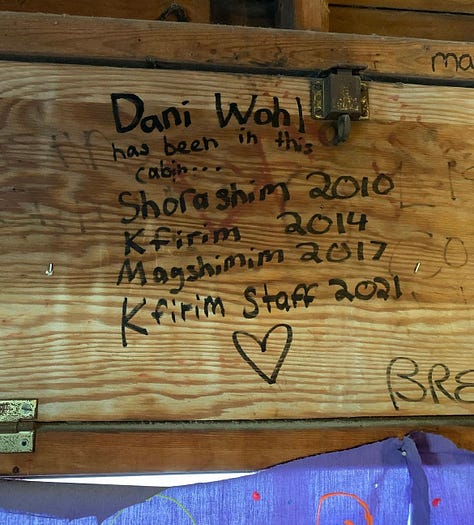
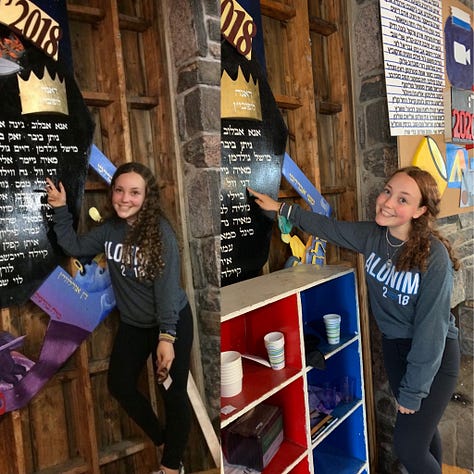
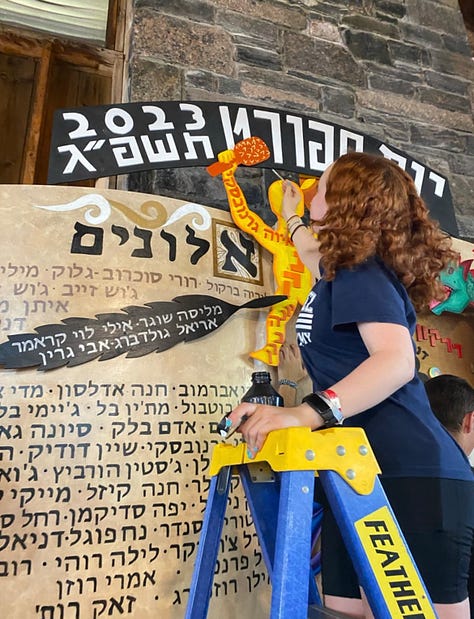
“Camp taste doesn't propose that it is in bad taste to be serious; it doesn't sneer at someone who succeeds in being seriously dramatic. What it does is to find the success in certain passionate failures.”
Camp is finding the success of certain passionate failures; Camp Ramah has seen many of mine.
Camp is a tender feeling; Camp Ramah fills me with many of the sort.
I wonder, often and especially now, if the feeling is mutual.


